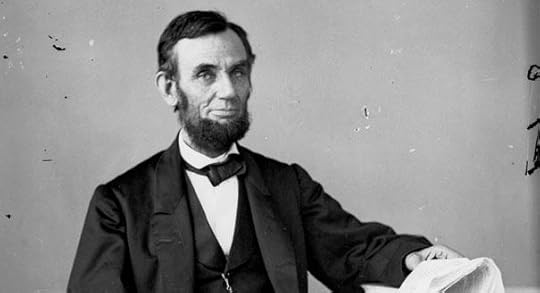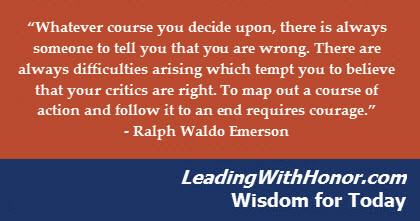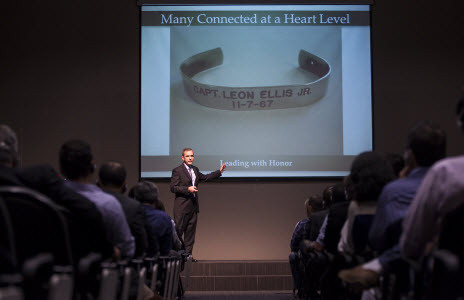Lee Ellis's Blog, page 257
November 9, 2016
5 Emergency Solutions for Collaboration Challenges
By Lee Ellis
Why does it seem more challenging than ever to collaborate? As fantastic as technology can be, it can also bring more complexity, disconnectedness, and distraction to daily work life. We have massive amounts of information at our fingertips, but the corresponding amount of collaboration must also increase.
Then, there’s our natural behavior as individuals. For most independent, self-sufficient people, collaboration isn’t so natural. That may work well for a solo performer, but leadership is all about getting work done through others. So, knowing your personal DNA behavior style as well as the people on your team can be invaluable in making collaboration successful.
Collaboration Guidelines
“Considering the times, collaboration is a critical aspect of leadership and potentially a key differentiator in those successful teams and organizations that get results.” [Tweet This]
Now that we have an awareness of the collaboration challenge, let’s look at four practical guidelines for improving our leadership in this area –
Take Time to Think—Think Before You Act. Some of the worst mistakes I’ve made came from jumping to action, giving direction, and assigning tasks before considering the realities of the current situation. My first responsibility is to get as much clarity as possible on the goal and how to get there. Second, it’s to consider the resources and options available—mainly the people on the team and their talents, passions, and workload. If you’re like me and move too quickly to action, make it a habit to stop and think first.
Delegate and Get Commitment. As we’ve already discussed in a previous blog, clarity is essential to successful execution and accountability. You know this is true, especially if you’ve had the frustration of working on a project and then learning that what you thought was the goal wasn’t what your boss wanted at all. When making assignments, you own the responsibility to make sure the other person understands what is expected. Describe the goals and discuss them until you are sure the person or team understands what you are thinking. Then discuss the timing and reporting so you have agreement on the expectations of the project. Taking time to get this alignment up front brings more effective execution.
Dialogue—Don’t Micromanage. As the leader, I like to know how things are going. I think of it as an ongoing dialogue, and it varies depending on the experience and capability of the person involved and the priority of the project. So a part of the dialogue is to keep me informed and feeling comfortable that things are on track. This is the essence of management. But just as important is my responsibility to support the person assigned to the tasks/project. This means giving feedback, which could include encouragement, coaching, mentoring, correction, training, or just listening. This is the essence of leadership. Throughout these interactions, we must be careful not to micromanage.
Learn to Engage Rather Than Dominate or Withdraw. We must manage our fears, and we all have them. Some of us have a natural tendency to dominate and control, while others tend to withdraw. Neither of these is effective for very long. When I feel fear coming on, I have to coach myself to believe, to adopt a positive attitude so that I can trust and empower others. In reality, good leaders have to consciously walk the line—balancing the needs of the person for freedom of action and your need to keep things on track.
Leadership Balance
One important point to recognize is that these four guidelines also develop a better leadership balance between getting results and building relationships! I’ve said many times in the past that I was grateful for having senior leaders in the Vietnam POW camps lead with these attributes in such a challenging and difficult experience.
Making the Decision to Collaborate
“The truth is that most people want to be successful and will work hard to get there. Good leaders recognize this and collaborate with them, knowing if their people succeed they will as well.” [Tweet This]
We all can grow more effective in our collaboration, and this type of leadership is becoming more critical every day. If you have growing leaders on your team such as Millennials, research shows that they work best in a collaborative environment. I think everyone does, but they walk in the door expecting it. And in case you have not noticed, they make up the majority of those walking in the door.
So what have you learned about collaboration? What works for you? Please share your experiences. LE
[Share This Article on Twitter]
 Watch this month’s Leadership Coaching Clip on this topic – complimentary, instant access in your inbox!
Watch this month’s Leadership Coaching Clip on this topic – complimentary, instant access in your inbox!
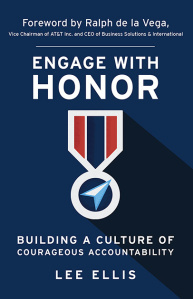 The topic of collaboration is a key step in the Courageous Accountability Model found in Lee’s latest book,
Engage with Honor
. Learn More and see the introductory Launch Package that we’re offering with your purchase. You may also purchase with your favorite such as Amazon or Barnes and Noble.
The topic of collaboration is a key step in the Courageous Accountability Model found in Lee’s latest book,
Engage with Honor
. Learn More and see the introductory Launch Package that we’re offering with your purchase. You may also purchase with your favorite such as Amazon or Barnes and Noble.

November 8, 2016
Lee Ellis Frequently Asked Question – “Why are accountability and self-awareness so very critical for the next generation of leaders?”
Lee Ellis Frequently Asked Question – “Why are accountability and self-awareness so very critical for the next generation of leaders?”
Answer – “Millennial expert Tim Elmore, of Growing Leaders, cites several issues that concern employers hiring Millennials such as –
(1) Work ethic. Grads lacked old-fashioned grit and expressed unwillingness to serve beyond the job description, to do whatever it takes to get a task done. and
(2) Responsibility. They were unable or unwilling to assume sole responsibility for their work. It was as if they wanted to “rent” their job, not own it.”
In the fifties and sixties, most young people were married and starting families by their mid-twenties. That’s a lot of responsibility and definite accountability for being autonomous. I believe the younger generations are more likely to have been sheltered from failure and its consequences.
Today, this is an era when the home, school, church, and community are all struggling, lacking the foundations and leadership to set the example and teach accountability. Workplace leaders have the most vested interests developing the younger generations. The good thing is that Millennials in general like to be coached and developed. So you could say the conditions are ripe for helping them develop.”
Learn More about the Engage with Honor process for training your entire team. Download a chapter sample and get the new Launch Package with over 10 resources to train your team!


November 7, 2016
Infographic – “12 Proven Career-Building Strategies From Experts”
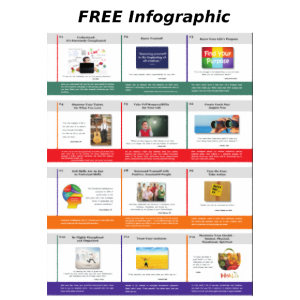 Do you or someone you know need to jumpstart their career? Don’t know where to start? One of our colleagues from “Discover Your Talent, Do What You Love” offers the infographic 12 Proven Career-Building Strategies From Experts.
Do you or someone you know need to jumpstart their career? Don’t know where to start? One of our colleagues from “Discover Your Talent, Do What You Love” offers the infographic 12 Proven Career-Building Strategies From Experts.
It’s very practical advice that we wanted to pass on to our Leading with Honor fans and friends—please check it out


November 6, 2016
On This Day in Leadership History for November 6, 2016
On this day in leadership history in 1860, Abraham Lincoln was elected to be the sixteenth president of the United States. Lee Ellis often refers to Lincoln’s leadership style and his critical skill in balancing results and relationships. What’s the leadership lesson? In the heat and pressure of being a leader, strive to get results while nurturing and building up your team. It’s a formula for long-term success!
Abraham Lincoln – Wikipedia


November 5, 2016
Learning to Engage in Team Collaboration: Lee Ellis Coaching Clip
In team collaboration, leaders must learn the soft but powerful skill of how to engage with team members. Collaboration is part of the Engage with Honor Courageous Accountability Model that Lee uses in leadership development and training.
Go to www.engagewithhonor.com to learn more. Special bulk purchase options are also available for leadership and team development.


November 4, 2016
Leading with Honor Wisdom for Today, November 4, 2016
“Whatever course you decide upon, there is always someone to tell you that you are wrong. There are always difficulties arising which tempt you to believe that your critics are right. To map out a course of action and follow it to an end requires courage.” – Ralph Waldo Emerson


November 3, 2016
4 WAYS TO BOOST YOUR TEAM ENGAGEMENT: It All Comes Down to the Right Kind of Connection
Lee Ellis and author and speaker, Michael Hyatt, synch together on this topic of team engagement and collaboration. Emphasizing the leadership tactic of “connection”, Michael shares four ways guaranteed to boost team engagement.
Please read his article entitled “ 4 Ways to Boost Your Team Engagement ” and share your experience too – thank you


November 1, 2016
Testimonial – “I needed strength–you were the perfect speaker to bring that strength across.”
Lee Ellis and team are regularly inspired by testimonials like this one from a recent executive that attended a global webinar event where Lee shared his Leading with Honor message –
“I can’t imagine what you went through, and it was perfect timing. I needed the inspiration. My father died last year at this time, and he was a Marine through and through. God has his way for sending messages, and I needed strength–you were the perfect speaker to bring that strength across. Thank you for your time!”
Want to hear Lee speak? Check out his Events page.


October 31, 2016
Fear is Fun for Halloween, but What about Leadership?
 One emotion related to the Halloween holiday is fear (all in fun, of course), but fear in leadership must be managed before it gets out of control. Fear will take us out of the battle and lead us to abandon our good intentions as leaders. It’s about adopting courage and honor as the guiding force for our daily decision-making.
One emotion related to the Halloween holiday is fear (all in fun, of course), but fear in leadership must be managed before it gets out of control. Fear will take us out of the battle and lead us to abandon our good intentions as leaders. It’s about adopting courage and honor as the guiding force for our daily decision-making.
To choose courage instead of fear in leadership, here are three things we can do to be more courageous –
Become more aware of your doubts and fears. Stop and reflect on the areas where you’re putting off making a decision or taking action. More than likely you need courage to move ahead.
Sort it out and make a plan. If you don’t have clarity, check in with a teammate or someone you trust to get their perspective of the situation. They don’t have the same emotional investment or concerns you have, and they may be able to encourage you in your next steps.
Lean into the pain of your doubts and fears to do what you know is right. You can’t go wrong doing right. Just start moving ahead with your plan. The Leading with Honor Courage Challenge card can be very helpful for coaching yourself in this area. Download or purchase a copy.
In hindsight, it’s amazing how often lies about ourselves and the situation are the source of our doubts and fears. Courage helps us disarm lies, discover truth, and ultimately deliver us more freedom. Please share your comments on this topic, too –
**You can read more about this topic in Lee Ellis’ latest book, Engage with Honor. Learn more, watch the trailer, and order your copies!


October 30, 2016
On This Day in Leadership History for October 30, 2016
On this day in leadership history in 1938, Orson Welles’ “The War of the Worlds” aired on CBS radio. The belief that the realistic radio dramatization was a live news event about a Martian invasion caused panic among listeners.
The leadership lesson? Perception is not always reality! Step back and take a more strategic look at the issue at hand to gain a more balanced perspective before making a decision.
War of the Worlds Radio Broadcast – Wikipedia




